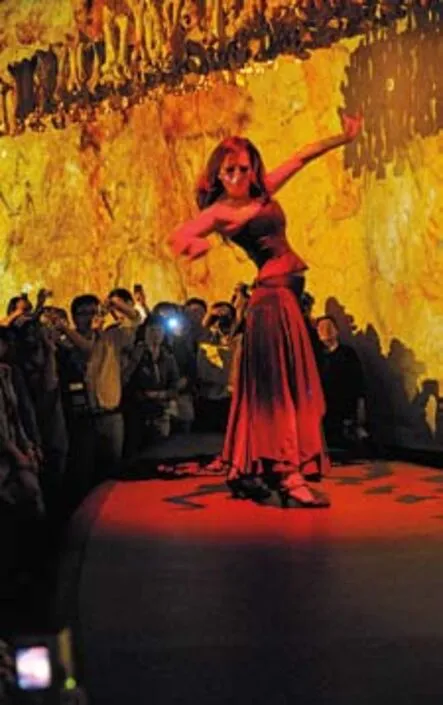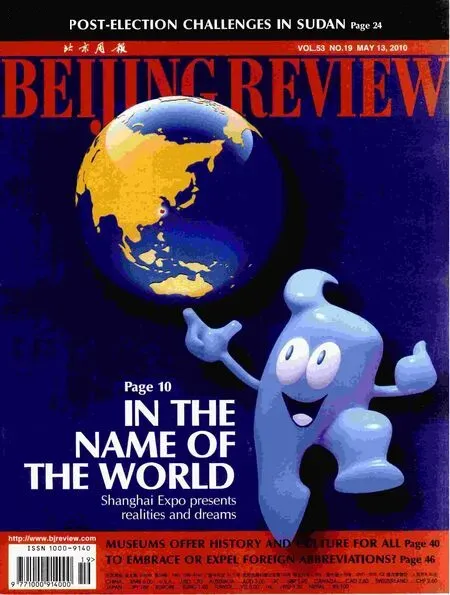May Day the Expo Way
By FRANCISCO LITTLE
May Day the Expo Way
By FRANCISCO LITTLE
The long queue wound its way forward like a python. It was hot. Umbrellas provided a continuous cover of shade against the blazing Shanghai sun. Ahead lay the entrance to the hand-weaved wicker basket-shaped Spain Pavilion. Getting into a pavilion—any pavilion—at the World Expo during the May Day holiday weekend was going to require mega endurance.
The girl in front of me was wolfng down a waffle that sent out the sweetest aroma.“Where did you get that?” I asked, swallowing hard. She pointed toward the Belgium Pavilion. I looked to where the line ahead of me wound its way into the distance. “Waffe or place in line?” I began to think. Line, line, line!

FLAMENCO FIRE: Spanish dance captivates the crowd inside the Spain Pavilion at Expo 2010
More than 200,000 people descended on the Expo on May 2 and the heat was on. Getting in was a breeze and security staff at the gates were slick and well organized. It was getting into the pavilions where the sweat set in. But despite long waits, everything worked and that was a big plus for my Expo experience.
Earlier in the day, my frst port of call had been the African countries’ exhibits, most of which are grouped under one very large roof. From the main face sculpture wall to every bit of Africana on display, bodies of visitors were draped, squeezed, stretched and primped into poses beyond imagination. I watched as a drummer from Ghana posed with an endless stream of people, all the while keeping his radiant smile—a true ambassador. In the Gabon Pavilion, the door attendant sat stonefaced, stamping the Expo “passports” thrust in his face by collectors without ever looking up. I felt his pain. These Expo passports have proven to be the most popular souvenir and allow you to travel the world and collect country “entry stamps” without leaving Shanghai.
Most of the African craft market stalls lay empty. Zimbabwean trader Welcome Mhuri told me the container carrying goods from Africa hadn’t arrived. I asked him if Iceland’s volcanic ash was responsible. He didn’t appreciate the humor.
The majority of the African pavilions provided little flavor of “home” and were muted, despite the occasional splash of color. A Mali music troupe injected some life into the cavernous hall. However, the toll of walking in the heat, even in the morning, saw many visitors at various stages of collapse. Others wrestled with Expo maps, trying to figure out where to drag their heat-stroked bodies next.
Outside in the sunshine a Japanese brass band was blowing up a storm. The South Africa Pavilion hadn’t opened yet, but the smiling face of Nelson Mandela brightened up Africa Square. The Egypt, Angola and Libya pavilions were in and out affairs. I had bigger fsh to fry.
Getting into the aluminum U.S. Pavilion was a test of nerves. The crowd in line passed the one-hour wait by watching for anyone who tried to sneak in, then took great pleasure in having them ejected by security guards. Once inside, technical hitches had us sweating through a drawn out welcoming video. All of the bigger countries had divided their presentations into sections to make crowd control easier. But Barack Obama’s greeting and a short film on how to overcome obstacles in city life went down well with the stressed audience.
Back outside, the temperature had risen to 30 degrees Celsius. A boy feinted and his mother started crying. Someone poured water over the boy’s head and the mother screamed that the boy would drown. He survived.
After a delicious Korean noodle lunch, the Italy Pavilion beckoned. It’s exterior was simple and elegant. Inside a new world dawned (What is it about Italians and design? They could make a cardboard box look like art.) It was all there—Ferrari, furniture, shoes (two archetypical shoemakers carved leather inside a giant glass walled workshop) and more. Along one wall the chairs and instruments of an orchestra had been bolted to the cement, while the other held elegant wedding dresses and ball gowns. It was a peep inside Rome. There was a cultural buzz here and everyone picked up on it. Wine and pasta displays, sports, remnants of the Roman Empire, food, romanticism. If I didn’t see another pavilion, this would have been enough. Onwards, ever onwards.
After a brief ice scream pit stop and winding through the informative Lithuania and Croatia pavilions, France came and went in a blur—a day in Paris, but too much wasted space. The posing of visitors became much more interesting then the pavilions.
Outside the queues had gotten longer. Germany, UK or Spain. I took a look to see which line was moving the fastest. Spain it was.
And there I stood, dodging umbrellas and wondering about that Belgium waffe. My daydreams ended abruptly as Spanish attendants dressed in what looked like camouflaged pajamas opened the front doors. Then all hell broke loose as we entered a corridor of surround sound and panoramic visuals—horses running, bulls charging, real Madrid crowds chanting. While we milled around deafened and under an incessant pop of camera fashes, a famenco dancer appeared out of nowhere, performing a routine that oozed sensuality under a seductive crimson light. Ok, I was impressed.
We poured out into the hot sun, our senses battered. And even after one day of endless pavilion visits, I still had so much more to see. The China Pavilion loomed large on the horizon. I was saving that for the next visit.
The author is a South African working in Beijing
EXPATS, WE NEED YOUR STORIES!
If you’re an expat living in China and have a story or opinion about any aspect of life here, we are interested to hear it. We pay for published stories. Submissions may be edited. E-mail us at contact@bjreview.com.cn

